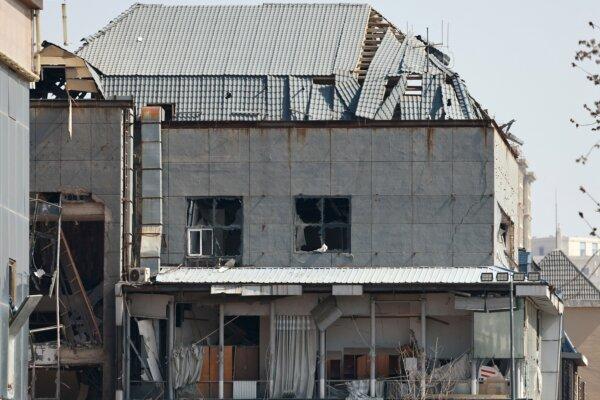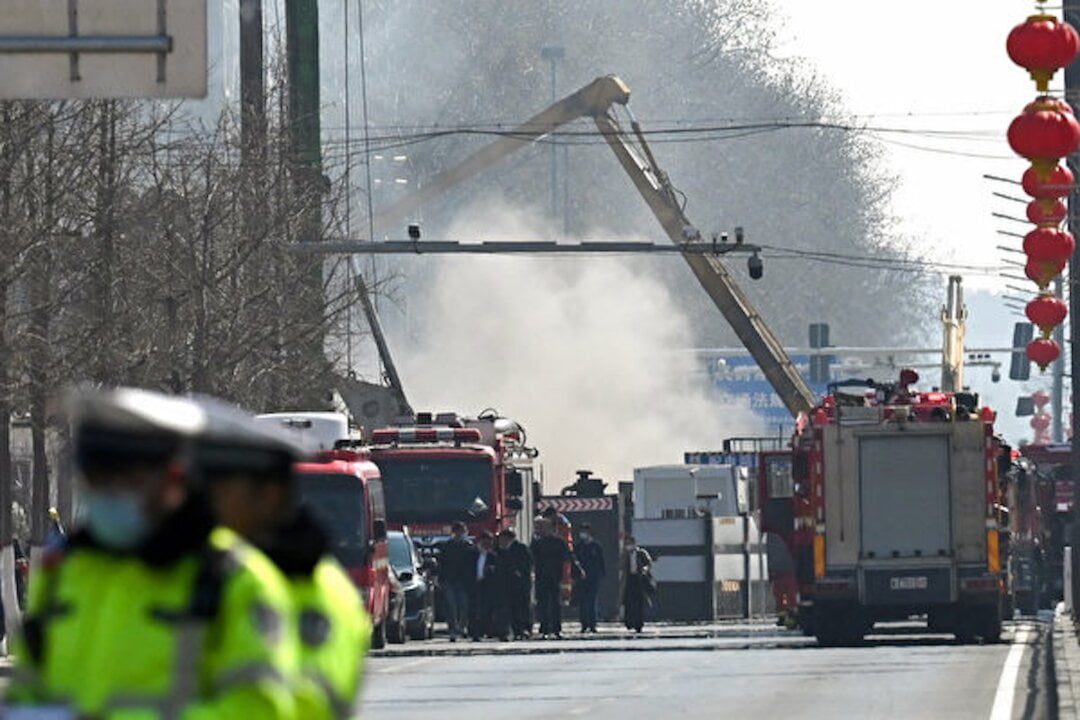CCP media reporters were roughed up by local police.
A huge explosion occurred outside Beijing just after the ruling Chinese Communist Party’s (CCP’s) Two Sessions top political meetings.
Local authorities blocked all media coverage of the explosion, including the CCP’s state media outlet CCTV, causing the government-controlled Chinese Journalists Association to issue a rare statement of protest against the treatment of reporters.
The explosion occurred on the morning of March 13 at Yingbin Road in Yanjiao Town of Sanhe City in Hebei Province, adjacent to the outskirts of Beijing. A four-story hotel collapsed after the explosion.
The Sanhe City authorities reported on March 14 that the on-site rescue work had been completed for the “deflagration accident” that occurred in Yanjiao. The officials announced that the accident caused seven deaths and 27 injuries.
However, the official numbers have been questioned by the public because of the massive scale of the explosion shown in photos and video footage posted on social media.
Mr. Yan, a local resident, told The Epoch Times on March 14 that the location of the explosion was close to the university town, where the population density is very high, and many more people had likely been injured.
According to video footage posted online, the explosion spread over a wide area. Local residents said that the glass windows of buildings 50 to 60 meters (164 to 197 feet) away were shattered.
The Sanhe City Emergency Management Bureau reported on March 13 that the explosion was caused by a suspected gas leak in a fried chicken restaurant. However, many Chinese media reports expressed doubts. Times Finance reported on March 14 that there was only one fried chicken restaurant, called Yongshun Fried Chicken, in the area where the incident occurred. A staff member of the fried chicken restaurant told the media: “Our store did not have an explosion, and we don’t use gas. We have always been using electricity to cook.”
In the full official report of the incident issued on the morning of March 14, authorities did not mention the cause of the explosion, only calling it a “deflagration.” By the afternoon, Liu Fulai, leader of the accident investigation team, said that a leak in the transportation pipeline caused the explosion in Yanjiao.After the explosion, local authorities immediately banned on-site media reporting, and state media reporters were violently dispersed and taken away by the local police.
According to video footage posted on social media, on the morning of March 13, when the CCP’s state broadcaster CCTV’s reporter Yang Haining was broadcasting live from the scene of the explosion, a police officer blocked the camera with his body, and the live broadcast had to be switched back to the studio.
That afternoon, another CCTV reporter, Xu Mengzhe, was also violently pushed away by the police while interviewing local people at the scene. Ms. Xu later posted a video recording of herself being pushed away from the scene by more than a dozen policemen. Soon after, her social media account was subsequently shut down.
On the evening of March 13, the CCP’s China Journalists Association posted an article on its official account on the Chinese social media platform Weibo titled “Legal Interviewing is the Right of Journalists” to support the CCTV reporters and raised three questions: Should reporters conduct interviews? Are reporters adding to the chaos? Can a press release really replace on-site reporting?
Yu Jianrong, a professor at the Chinese Academy of Social Sciences, wrote in a blog post: “It is good that the China Journalists Association speaks out for CCTV reporters who are blocked from reporting. It would be even better if the China Journalists Association spoke out for any media outlets that have been banned from reporting. The unfair treatment of reporters from other media has long been ignored, which is why reporters from the CCTV were expelled from the scene today.”
According to a report by the Committee to Protect Journalists, an international human rights organization, China is the country that imprisons the most journalists in the world.
On March 14, the CCP’s Sanhe Municipal Government issued an apology, stating that “frontline staff have poor communication skills and use crude and simplistic methods” and “felt deeply guilty and apologized” for the obstruction of CCTV correspondents’ reporting in Yanjiao.

Independent current affairs commentator and writer Cai Shenkun told The Epoch Times on March 14 that CCTV reporters speak on behalf of the CCP, and if the local security staff prevent the Party from speaking out, the problem is very serious.
“They wanted to drive away all reporters, and ended up offending the CCTV reporters,” Mr. Cai said.
During the Two Sessions, a fire broke out in the Jiangsu Provincial Public Security Department building and an explosion occurred in the Zhangjiagang Municipal Government building in Jiangsu Province, in addition to other incidents of suppression of Chinese people trying to publicly express their grievances. However, the CCP’s official media didn’t report any of the incidents. As the Two Sessions are over, observers have said that the situation is relatively less sensitive now for the CCP, and that’s why it hasn’t blocked news of the explosion in Yanjiao.
Mr. Cai said he believes that Yanjiao’s proximity to and close ties with Beijing eventually forced the CCP’s hand.
“Yanjiao used to be called the eastern suburbs of Beijing. … half of the people living in Yanjiao are Beijingers, and the other half are non-locals who work in Beijing. It’s impossible to hide the news, so the officials had to report it,” he said.
“[The CCP] reported it as soon as possible and tried its best to characterize the incident as a gas explosion in the restaurant, so as not to let people associate or speculate about other things. In this place, this incident cannot be suppressed at all.”
Ning Haizhong and Luo Ya contributed to this report.

